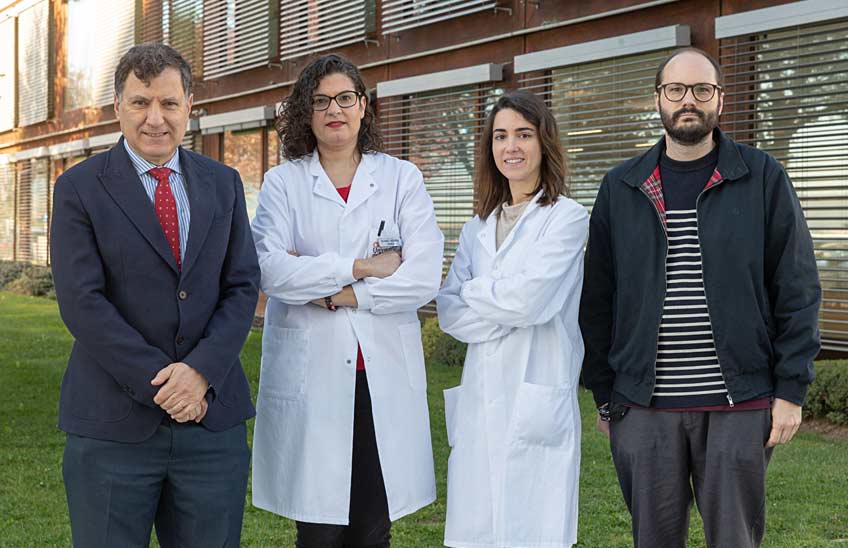International research discovers a strategy that increases the efficacy of immunotherapy
This is the result of an experimental study carried out by scientists from the Cima University of Navarra and the high school of Biology and Experimental Medicine of Buenos Aires (Argentina).

FotoManuel Castells<br>/Ignacio Melero, Elixabet Bolaños, Irene Olivera y Álvaro Teijeira, autores del trabajo realizado en el Cima Universidad de Navarra
03 | 04 | 2023
Researchers from Cima University of Navarra, in partnership with scientists from high school of Biology and Experimental Medicine of Buenos Aires (IBYME-CONICET) in Argentina, have discovered a strategy that increases the efficacy of immunotherapy in animal models.
Adoptive cell therapy is an immunotherapy subject based on the culture and transfer to the patient of lymphocytes with the capacity to recognize and destroy tumors. "In this work we have shown that the therapeutic results of this immunotherapy increase notably if the lymphocytes are transferred by means of messenger RNA so that they simultaneously produce pro-immune factors (interleukin-12 and interleukin-18). This combination increases antitumor efficacy," says Dr. Ignacio Melero, co-director of the Immunology and Immunotherapy Program at Cima, part of the Cancer Center Clínica Universidad de Navarra, and senior author of the study.
Moreover, the work confirms that lymphocyte transfer therapy is more effective if administered intratumorally and repeatedly. The results have been published in the latest issue of the scientific journal Cell Reports Medicine.
Molecular mechanisms
One of the novelties of this study is that it uncovers three molecular mechanisms that determine the strong synergistic effect and also explain its potent efficacy.
"Thanks to partnership with Dr. Gabriel Rabinovich and Dr. Karina Mariño in Argentina, we have been able to clarify that the lymphocytes used acquire adhesion molecules (called ligands) that allow them to interact more efficiently with the cells that line the blood vessels. This process allows the lymphocytes to migrate more efficiently into tumor metastases, which they can then recognize and destroy. This mechanism is determined by the presence of modified sugars in the lymphocyte membrane proteins," says Irene Olivera, researcher at Cima and first author of the study.
In the opinion of Dr. Melero, head of group of the Cancer CIBER (CIBERONC), "the participation of the Argentinean group has been crucial in revealing these mechanisms. Dr. Rabinovich is perhaps the most important international figure in the application of glycobiology in the study of the functions of the immune system and its applications in immunotherapy".
These experimental programs of study are a continuation of another article published by this same group of research from Cima in the journal Cancer Cell two years ago and which experimentally demonstrate that the efficacy of treatments with TIL and CAR cells can be improved. "Our challenge now is to get funding to be able to put test the strategy in a clinical essay . To do this, we are forming a collaborative consortium with other national researchers with experience in cell therapy. We are also in negotiations with a pharmaceutical company that is a leader in the application of adoptive cell therapy," concludes Dr. Melero.
This work, carried out at framework of CIBERONC, has received funding from the Ministry of Science and research, the association Española Contra el Cáncer and the Ministries of Health and Industry of the Government of Navarra.
reference letter bibliographic
→ mRNAs encoding IL-12 and a decoy-resistant variant of IL-18 synergize to engineer T cells for efficacious intratumoral adoptive immunotherapy
→ Cell Reports Medicine. 2023 Mar 17;100978. doi: 10.1016/j.xcrm.2023.100978.
